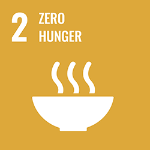About Zero Hunger
End hunger, achieve food security and improved nutrition and promote sustainable agriculture.

We work towards the UN's Sustainable Development Goal 2 - Zero Hunger, to create a better and fairer world.
The 2030 Agenda for Sustainable Development was adopted in 2015 by all United Nations member states. It provides a blueprint for peace and prosperity for people and the planet.
Find out more about our work across all the UN's Sustainable Development Goals.
End hunger, achieve food security and improved nutrition and promote sustainable agriculture.

The University of Stirling is an integral part of the innovative ‘Fuel To Pot’ project, funded by the Arts and Humanities Research Council. The partnership addresses the critical issue of solid fuel use in household cooking, affecting over 3 billion people globally, especially those in low and middle-income countries who lack access to modern energy infrastructure.
Working closely with community members in Ndirande, Malawi, the project employed participatory and interdisciplinary methods to delve into the lived experiences of women and children in households using solid cooking fuels and to understand the ‘fuel to pot’ journey.
Urgent restructuring of the food system is required to make it environmentally, economically and socially sustainable. The planned research at the interface of mathematical modelling and data science, particularly focused on understanding non linearities in the food system, will provide insights into where the risks are in the current system and what action is needed to avoid them.
The Beacon Project, funded by Medical Research Council (MRC), uses hydropower development as a model system and employ interdisciplinary thinking and methods to quantify the trade-offs, conflicts and synergies between SDGs and stakeholders.
The overarching aim of The Beacon Project is to identify, forecast, prevent and mitigate conflicts associated with development processes, to achieve equitable sustainable development now and beyond the 2030 sustainable development targets.
"Take when you need, give when you can" is the ethos of the student-led Community Food Initiative. The Students’ Union launched the Community Food Initiative in November 2022 with the Community Fridge and Pantry, which is available to students and staff, and is located centrally in one of the main University buildings. Generously supported by Stirling Alumni through The Stirling Fund, the Community Food Initiative aims to alleviate food poverty and financial stress, whilst encouraging food sustainability and reducing waste.
People and The Environment is a first-year module that introduces students to the concepts of sustainability, the environment as a holistic working system and the patterns of human resource use. The module develops and explores these concepts and provides student with an understanding of the underpinning, scientific fundamentals.
Students explore sustainability through four key themes; Introductory concepts: people, environment and sustainable futures; Soils, agriculture and global food security; Global water resource management; and the global biosphere and conservation.
The Institute of Aquaculture (IoA) is an international centre in aquaculture and the largest of its kind in the world. It leads the world in a vision to tackle global problems of food security, hunger and sustainability through aquaculture. This has been recognised through the award of the Queen’s Anniversary Prize.
IoA has an international reputation for teaching, world-class research, technological innovation and consultancy in aquaculture. IoA’s degrees teach students about all subjects relevant to global aquaculture, including the culture of many species, such as crocodiles and turtles. IoA teaches students everything they need to know for a career in aquaculture, marine biology, and related areas such as pharmacy and biotechnology.
The Community Garden is a large space of land on campus which consists of multiple growing beds, a greenhouse, large polytunnel, wildlife spaces and an orchard close by. Gardening sessions hosted by the Students’ Union encourage participation and create an opportunity for students to learn about community-grown food, permaculture and to work on biodiversity projects.
The University offers a range of healthy and affordable food options to students and staff on campus. Every food outlet offers vegan or vegetarian options on 25% of their menu with deals available for students. The University also pledges to find practical ways to supply healthy, fresh, seasonal and sustainably grown food which represents value for money and promotes the highest standards of animal welfare through its procurement strategy.
Part of the University’s Institute of Aquaculture (IoA), NATIH will lead the development and deployment of the new technologies and systems required to support growth in the production of aquatic food for human consumption, while reducing the impact on natural resources.
NATIH is is funded by a £17 million investment by the UK Government through the Stirling and Clackmannanshire City Region Deal, as well as a £1 million Wolfson Foundation grant.
The Green and Blue Space is a Sustainability Hub on campus, which includes projects such as the Fairshare recycling programme, the Foodhive zero waste shop and the Community Garden and Orchard. It is led by students to deliver sustainability campaigns and activities to achieve change. From offering zero waste products and sustainable lifestyle swaps to re-purposing and re-selling unwanted homeware, clothing and electronics, saving them from landfill. A range of plastic-free lifestyle items including soaps, shampoos, body washes and toothbrushes are available to help staff, students and the public to minimise their waste.
The University of Stirling and Clackmannanshire Council were instrumental in pioneering a community-led food growing project using renewable energy. The Living Lab will transform derelict land next to Alloa’s Forthbank Recycling Centre and lead to the installation of a modular building for mixed methods in growing produce, along with solar panels to help grow the food, and a rainwater capture system.
People from the local community can engage with The Living Lab for learning and food growing opportunities. It is hoped that the Lab can be scaled up to include 95 hectares for community learning, growing and energy production, delivering a wide range of green jobs, skills, inward investment and high-quality careers. Long-term the project would also be the focus for skills development and training as well as a local resource and a potential tourist attraction.